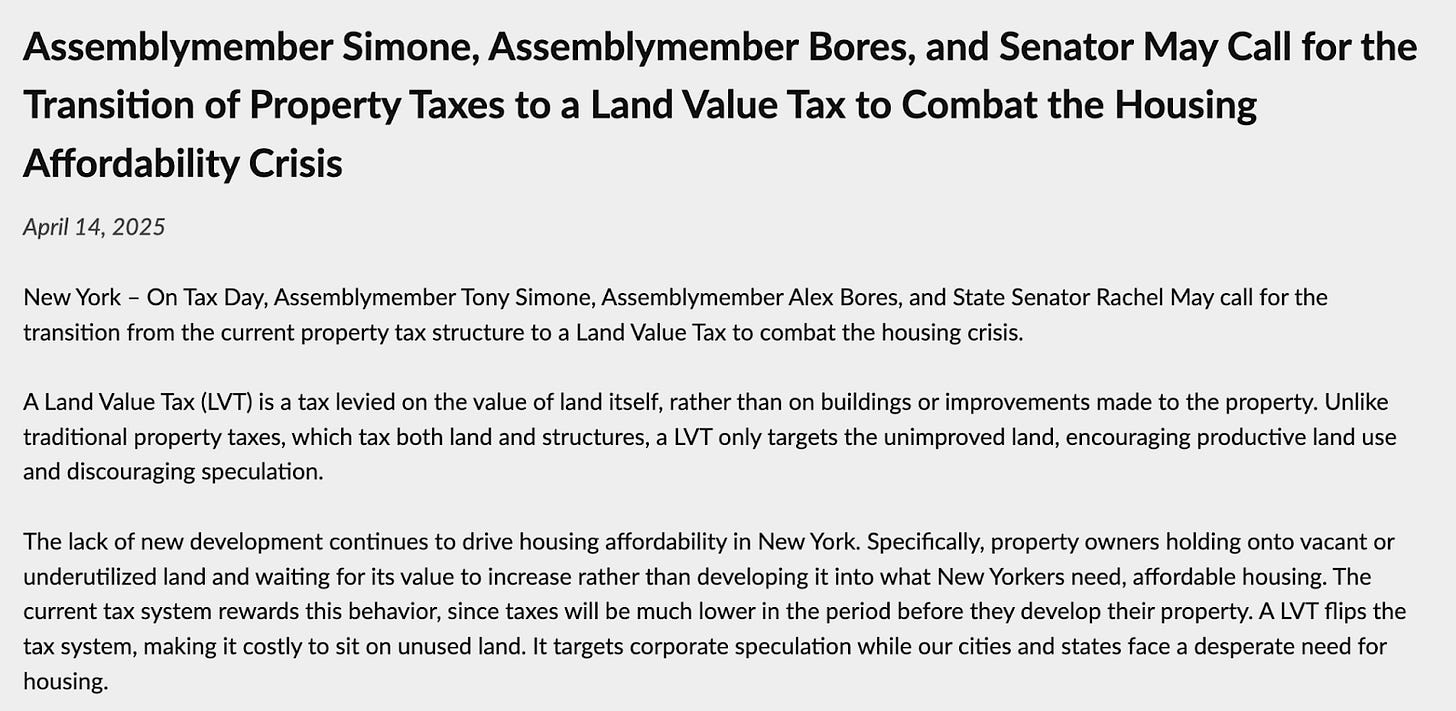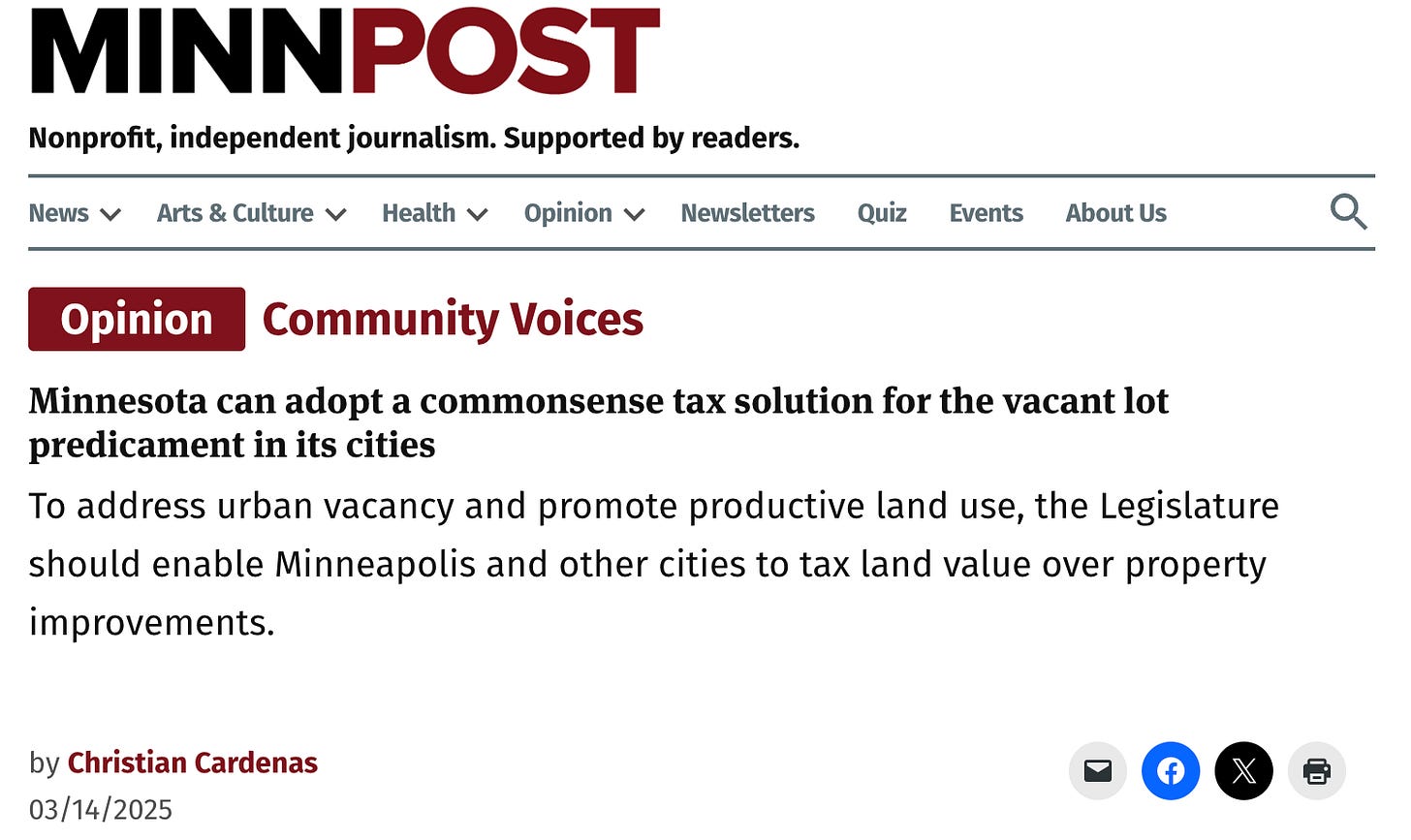LVT Landscape #2: Land Value Tax Hits the News
A bill passes a state senate! And, more media coverage and interest grows for land value taxes.
Hello All,
Welcome to the second edition of LVT Landscape, your update on the latest developments in land value taxes. It’s been just over a month since our first issue, and there’s exciting news to share!
New York

In our last edition, I covered bills S1131A / A3339A introduced by State Senator May and Assemblymembers Bores and Simone. Momentum is building around these proposals. In State Senator Rachel May’s words.
The sponsors have issued a press release and are actively seeking support from elected officials across New York who are interested in implementing a land value tax (LVT). In State Senator Rachel May’s words:
Shifting tax burdens from buildings to land has great potential for our cities. Throughout the very different economies in New York State, split-rate taxes can spur economic and housing development and ensure our communities are vibrant and thriving. I am proud to sponsor this bill and look forward to working with my Assembly colleagues to get this bill to the Governor’s desk.
In 2023, Buffalo passed a resolution requesting state authorization to adopt an LVT, and the state legislature is now responding. Interest is growing in cities beyond Buffalo, and the press release is generating media attention. If you live in New York, the state representatives are seeking local city and county councilmembers to voice their support, reach out to me if you are interested in supporting the effort.

Meanwhile, you may have seen Steve Hoskins piece last week on the property tax assessment system in New York City. He partnered with Community Services Society to write and publish a report on the upside-down nature of NYC’s property assessment system. The report recommends implementation of a land value tax and generated media headlines of its own.
Maryland
As you may recall, Maryland has been considering two bills to enable Baltimore to implement a split-rate tax. One of these bills has already passed the state senate.
HB1178 was introduced by Delegate Caylin Young to provide full tax parity to Baltimore, giving it the same right to set different rates on building and improvements as other cities. This bill appears likely to be tabled for a summer study. This is common in legislative affairs. When a state legislature wants more information on a topic, they will have a summer study done while the legislature is not in session and then reconsider the bill in the next legislative session.
But here’s the big news: SB 472, which allows Baltimore and other counties to set a higher land tax rate specifically for land within one mile of rail lines, has passed the state senate! The bill passed on a vote of 12-1 and is now in committee in the state house and enjoys strong support from the ATU local transit union, which has been vocal in advocating for LVTs to fund and develop transit corridors.
Minnesota
Legislation to enable cities in Minnesota to enact a land value tax continues. The house bill, HF 161, now has eight authors as members continue to sign on.
Other Media
The IMF recommends New Zealand implement a land value tax.
Realtor.com interviewed me and covered the potential for LVT to spur housing development
Lars and I appeared on Complex Systems with Patrick McKenzie (@patio11)
The National Housing Crisis Task Force, composed of mayors and housing policy experts, recommends land value tax in its State and Local Housing Action Plan
Know of any movement in your area or know any local electeds interested in LVT? Reach out: greg@landeconomics.org. Let’s spread this progress everywhere.





I also posted an article on this, citing the channel 10 (ABC) coverage, here: https://commonground-usa.net/land-value-tax-pilot-program-proposed-to-make-new-york-housing-affordable/ and included the message I sent my state Senator at the end for others to maybe follow. The bill itself doesn't talk much about the benefits of the change, so it falls to media and advocates to do that.
There are only 3 co-sponsors on the Senate side now and I think only the sponsor himself on the Assembly side, so there's a lot of work to do to get it to the majority needed for passage. Let's get started!
This is great news and a good start for Georgism in the USA. How about a NVT network value tax for the top 100 internet companies to replace income taxes.